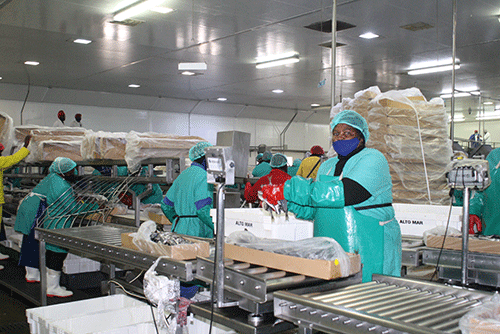Adding value to horse mackerel is not a farfetched idea, but a reality and a lucrative concept that needs to be given the opportunity to blossom and contribute in terms of job creation and poverty alleviation.
This is the view of the chairperson of the Wet Landed Horse Mackerel Association, Jason Angala, who has high hopes for the horse mackerel industry.
“We cannot stress enough the importance and urgency of this matter to ensure the survival of the horse mackerel industry, especially the wet landed horse mackerel sector. It will be irresponsible and negligent to allow the collapse of such an important sector of the fishing industry while the resource is healthy, available and sustainable,” he says.
The current total allowable catch (TAC) for horse mackerel is set at 350 metric tons.
A freezer quota is when the fish caught by vessels is exported without processing while a wet quota is when the catch is processed on land at a processing, plant in the country, thus creating or sustaining jobs.
Angala explained that the Namibian canning industry collapsed with the disappearance of the pilchard resource, which only operated for a short season during each year.
“Pilchard stocks have now declined around the world, which have opened a door for the horse mackerel industry. At present, Namibian canneries have a capacity of approximately canning 1.2 million cans per day, and as much as 150 000 tons of raw material per year. With an all-year-round horse mackerel resource, this value adding opportunity is becoming a strong reality for Namibia, and depends on the support of the Namibian government to make this possible,” Angala explained.
He added that if fully supported, with all-year round quota and fish, this canning sector as part of wet landed can employ 1 200 Namibians full-time.
Employment prospects
The prospects for Namibian jobs are unlimited in the wet landed horse mackerel industry. For this reason, a wet fish sector has been established around the globe. At present, based on a small percentage of the TAC, 2 000 jobs have already been created. It is important to make this sustainable for continued growth.
The same has been done in the Namibian hake industry, which started as 100% freezer, and today it is 70% wet. This is, however, in the hands of the Namibian government to lay the foundation, to support and incentivise the wet sector, and set clear and strict regulations and guidelines.
Handicap
Presently, wet operators are unable to pursue fishing operations in the current fishing grounds during winter months when operations come to a complete standstill. The bulk of the horse mackerel resource moves inside the 200m depth isobar during this period.
“We believe most other countries on the same drive towards wet landed fish are incentivising land-based operations in many ways such as fishing area handicap, levies, etc. But Namibia offers none to the current highly invested wet landed horse mackerel sector.
“The wet sector can at present employ approximately 2 000 Namibians, which is 10 times higher per ton than the freezer sector.
“Take note that in South Africa, the fishing of mature horse mackerel started from a depth of 130m for decades, and they have a healthy and sustainable resource,” said Angala.
Without this measure, he noted, it will be impossible to have a wet fish horse mackerel industry with meaningful all-year-round jobs.
He said the proposed relaxation has minimal or no risks to the conservation of the resource, and the total allowable catch (TAC) is the main conservation measure that ensures that a particular resource is not over-exploited.
Gradual increase
The Confederation of Namibian Fishing Industries’ chairperson, Matti Amukwa, also says he wants to see the horse mackerel industry gradually moving to 70% wet landed and 30% freezer, like the hake industry.
“This ratio has created more than 10 000 jobs in the hake industry, compared to the 2 000 of horse mackerel, which has the biggest TAC at the moment.
We will, however, definitely see a gradual increase in wet landed as the process needs to be done slowly to lessen the impact it might have on the freezer sector as they also made investments in term of vessels,” Amukwa explained.
He added that the TAC for horse mackerel is way too big for the 2 000 jobs it created. “Those are the imbalances that we need to address; not to say that everything will go to wet, but that we will have to balance both sectors to create more jobs,” he said.


